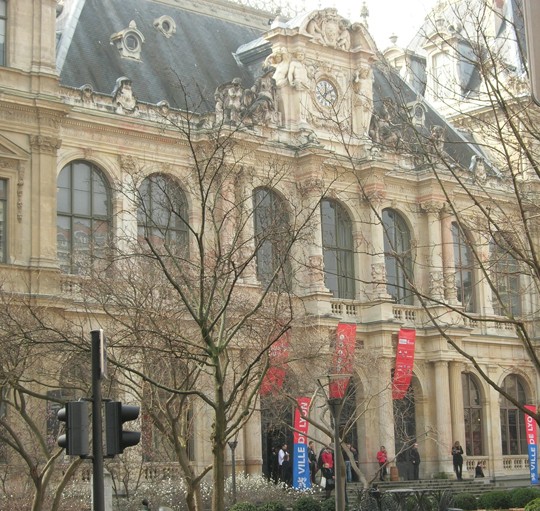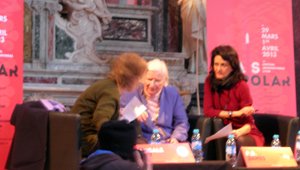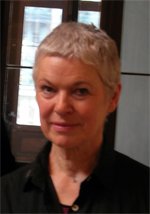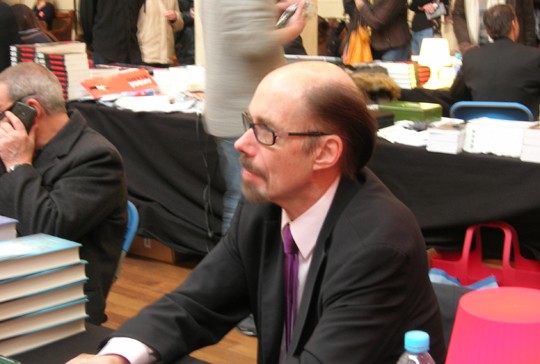 The French city of Lyon played host to the Quais du Polar over the Easter weekend. With 60,000 crime fiction lovers in one place, it’s one of the biggest literary festivals in the world. Needless to say, I’d been looking forward to this event for ages. Now that it’s over, all I can say is that Quais du Polar is indeed a fantastic celebration of crime fiction! It gives you the chance to see some of the world’s best crime authors up close and personal, and to get your hands on far too many books – luckily, I took an extra suitcase with me!
The French city of Lyon played host to the Quais du Polar over the Easter weekend. With 60,000 crime fiction lovers in one place, it’s one of the biggest literary festivals in the world. Needless to say, I’d been looking forward to this event for ages. Now that it’s over, all I can say is that Quais du Polar is indeed a fantastic celebration of crime fiction! It gives you the chance to see some of the world’s best crime authors up close and personal, and to get your hands on far too many books – luckily, I took an extra suitcase with me!
But what makes a good crime festival? We think it takes four key ingredients, and all of them were present in Lyon:
Fabulous people and prizes
Some of the biggest names in international crime fiction show up in Lyon every year, although there are always some last-minute changes to the programme – this year, Patricia Cornwell couldn’t make it. However, we did have the pleasure of hearing the peerless grande dame of detective fiction, PD James (below right). She was given the Medal of Honour of the City of Lyon.
 Henning Mankell opened the festival and introduced his favourite film – the Jack Nicholson classic Chinatown. Petros Markaris was awarded the European Crime Fiction Award for his Crisis Trilogy, portraying the grim realities of present-day Athens. The winner of the French Quais du Polar award was Olivier Truc for his novel Le Dernier Lapon, which translates as The Last Laplander.
Henning Mankell opened the festival and introduced his favourite film – the Jack Nicholson classic Chinatown. Petros Markaris was awarded the European Crime Fiction Award for his Crisis Trilogy, portraying the grim realities of present-day Athens. The winner of the French Quais du Polar award was Olivier Truc for his novel Le Dernier Lapon, which translates as The Last Laplander.
The really interesting aspect of the festival is the delightful mix of both established and up-and-coming authors, debut novelists and bestselling international names, French and English… with a few other languages thrown in for good measure. “Why aren’t there more books being translated into English?” queried Harlan Coben “I want to read all of these people I’ve met here and my French is non-existent!”
Coben and Jeff Abbott were on the same panel as relative newcomer Elsa Marpeau, making her laugh with their no-nonsense approach to fame, money and being an artist. “I’m not precious about my writing,” said Abbott. “I see myself as an entertainer rather than an artist or craftsman. Artists starve. When people complain that it’s so difficult to write, I think, ‘It’s my job, the one I wanted and made for myself, so I’d better get on with it.'”
The aforementioned Petros Markaris and John Burdett were debating how the urban landscape, poverty and violent news items are portrayed in crime fiction with two young French writers from the Parisian banlieue, Rachid Santaki and Jérémie Guez. “It’s becoming impossible to write crime fiction in a place like Greece, because no matter what story you come up with, the readers see or hear far worse than this all day long,” said Markaris.
 Donna Leon and Marcus Malte discussed the musical taste of their detective creations – opera and jazz, respectively. Meanwhile, Sylvie Granotier (right), Gillian Flynn and Sam Millar participated in a live recording of the popular literary show Mauvais Genres on radio station France Culture.
Donna Leon and Marcus Malte discussed the musical taste of their detective creations – opera and jazz, respectively. Meanwhile, Sylvie Granotier (right), Gillian Flynn and Sam Millar participated in a live recording of the popular literary show Mauvais Genres on radio station France Culture.
And it’s not just the guests who are delightful, but also the loyal audience. Jeffery Deaver told me he couldn’t believe how knowledgeable and passionate readers are, showing up in droves even on Easter Sunday and just after the clocks had gone forward. I also heard behind-the-scenes gossip about the festival, its organisers and the best new crime authors from those fantastic French crime bloggers Velda and Marine. The indefatigable translator and publisher Anne Trager of LeFrenchBook took me under her wing and introduced me to several of her authors.
A great location
Lyon is a picturesque and atmospheric backdrop for a crime festival, but I was worried that its sheer size would make it hard to move from one venue to the next. Luckily, they had anticipated we might not all like sprinting, so many of the panel events were held at Crime HQ, AKA the city’s Chamber of Commerce, which was formerly the Silk Trading Exchange. All of the book signings and sales also took place there.
The prize-giving ceremony took place in the 17th century gilded Town Hall, the Opera seemed to house many of the more scientific (and/or sci-fi minded) panel discussions, while the baroque Chapelle de la Trinité played host to hour-long Q&A sessions with PD James, and others. All were within a few hundred yards of the main building, with plenty of cafés dotted thoughtfully along the way. Admittedly, you had to venture a little further afield to see all the film screenings, but who wouldn’t want to see those films in the house and home cinema of the Lumière brothers?
Friendly informality
I was amazed at how open and relaxed the atmosphere was. The writers were not ushered on stage for their event and then quickly ‘disappeared’ until their next official appearance. Instead, many of them mingled freely with the public, were happy to have their picture taken, chat informally, even give a mini-interview. Of course some of the book signings were so popular that you only got to spend 20 seconds with the author, but most of the writers did make an effort to get to know their readers.
 I got to discuss French wine with Jeffery Deaver (above), the expat lifestyle with Elsa Marpeau, which of her books is her current favourite with Brigitte Aubert, and the influence of American comic books with David Khara. The latter is a rising star of French thrillers, whose first translation into English we’ll be reviewing shortly. “If what they mean by typically French literature is something boring, then I don’t want to be a part of it,” he said.
I got to discuss French wine with Jeffery Deaver (above), the expat lifestyle with Elsa Marpeau, which of her books is her current favourite with Brigitte Aubert, and the influence of American comic books with David Khara. The latter is a rising star of French thrillers, whose first translation into English we’ll be reviewing shortly. “If what they mean by typically French literature is something boring, then I don’t want to be a part of it,” he said.
Perhaps this relaxed atmosphere and intimacy contributed to the fact that many authors let down their guard and came out with quite personal stories and points of view that went deeper than the usual book PR. For instance, PD James revealed: “I would like to write one last Dalgliesh. I have the setting, the plot outline, the ending, but I need to find the time for it. I get asked to do a lot of things and find it hard to say no, even if I don’t have a lot of energy nowadays. But I promise I will make every effort to finish this.”
Meanwhile Sylvie Granotier admitted that perhaps there is an inferiority complex amongst European crime authors. “I too was guilty of the belief that all good crime fiction is written by the Americans, but now I have come to appreciate the diversity of European and other crime fiction. The more diverse the points of view, the richer our world,” she said.
And there was humour too – particularly about small places which so often play host to fictional crime series. “The crime rate on the island of Lewis is very low: one murder a century. So when my publisher said they wanted a trilogy set there, I thought we would have to wait 300 years for that to happen,” said Peter May.
Something for Everyone
Despite the proximity of the locations and mad dashes in the rain, I had to admit defeat. There were simply too many overlapping events: how to choose between Qiu Xaolong, Gillian Flynn and Frank Tallis, all on different panels, all on fascinating topics? Or how about choosing between Donna Leon, Jean-Christophe Grangé and exciting Japanese author Ira Ishida – all on at the same time, in different locations? In the end, queue size and common sense had to dictate a more moderate pace.
My children became crime fiction lovers themselves, as they learnt about fingerprinting, played board games and had books signed by that famous reporter/detective Geronimo Stilton, in full mouse outfit. He took the time to chat to each child individually, remind them to eat their cheese and confided in us that London was his second-favourite town after Lyon. And after sitting and listening to authors you could enjoy films introduced by some of your favourites, as well as theatre performances and exhibitions, a Prohibition-themed noir ball, guided walks around Lyon’s real-life crime scenes. You could even win a flight to an Asian destination of your choice if you solved The Mystery of the Jade Dragon, a clue-strewn crime scene and treasure hunt all around the city.
And next year?
If this has whetted your appetite for a sprint trip to Lyon next year, here are four tips to set you up…
1 – Do not worry if your French is poor or non-existent, as headphones and simultaneous interpretation are available for most events.
2 – Bring sturdy, comfortable footwear, as walking and standing in queues takes its toll on your feet.
3 – Take your whole family along and make a holiday of it. There is so much to see and do in the city itself, even if the weather is not at its mildest at this time of year. But maybe you can combine it with a skiing holiday?
4 – And if you do read French, bring an extra suitcase! You will not leave empty-handed.
Discover five of the best contemporary French crime authors here.
Click the ad to the right to receive a free excerpt from The 7th Woman by Frédérique Molay, published by Le French Book.








